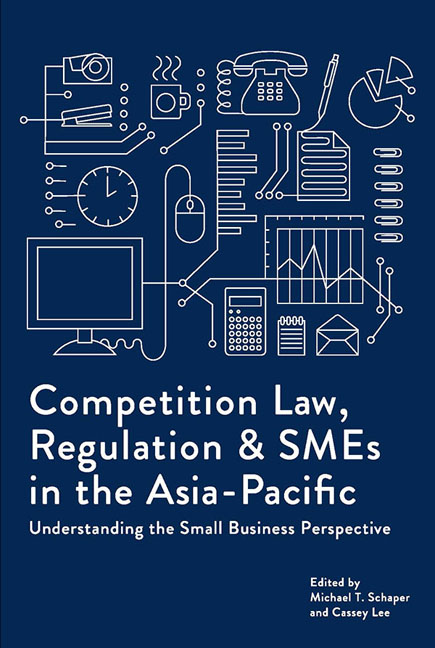 Competition Law, Regulation and SMEs in the Asia-Pacific
Competition Law, Regulation and SMEs in the Asia-Pacific Book contents
- Frontmatter
- Contents
- Foreword
- About the Contributors
- 1 Introduction: Making the Invisible SME More Visible in Competition Policy and Law
- Section 1 Theories And Basic Concepts
- Section 2 Smes And Competition Law
- Section 3 Country Studies
- 12 Competition Law, Regulation, and Trade: Implications for Productivity and Innovation in Singaporean Manufacturing SMEs
- 13 SME Law and Abuse of a Superior Bargaining Position in Japan
- 14 Competition Law, Policy, and Smes in South Korea
- 15 Competition Law Implementation and Smes: Singapore's Experience
- 16 Competition Law and SMEs in Indonesia
- 17 Smes and Malaysia's New Competition Law: Experiences to Date
- 18 Competition Policy and Sme Development in Vietnam
- 19 China's Anti-Monopoly Law and the Sme Sector
- 20 A New Competition Agency Learns to Deal with Smes: The Case of the Hong Kong Competition Commission
- 21 The Regulation of Television Programme Production Contracts under Japan's Subcontract Act
- 22 Small Enterprises and Competition Policy in Pacific Island Countries
- Index
19 - China's Anti-Monopoly Law and the Sme Sector
from Section 3 - Country Studies
Published online by Cambridge University Press: 05 August 2017
- Frontmatter
- Contents
- Foreword
- About the Contributors
- 1 Introduction: Making the Invisible SME More Visible in Competition Policy and Law
- Section 1 Theories And Basic Concepts
- Section 2 Smes And Competition Law
- Section 3 Country Studies
- 12 Competition Law, Regulation, and Trade: Implications for Productivity and Innovation in Singaporean Manufacturing SMEs
- 13 SME Law and Abuse of a Superior Bargaining Position in Japan
- 14 Competition Law, Policy, and Smes in South Korea
- 15 Competition Law Implementation and Smes: Singapore's Experience
- 16 Competition Law and SMEs in Indonesia
- 17 Smes and Malaysia's New Competition Law: Experiences to Date
- 18 Competition Policy and Sme Development in Vietnam
- 19 China's Anti-Monopoly Law and the Sme Sector
- 20 A New Competition Agency Learns to Deal with Smes: The Case of the Hong Kong Competition Commission
- 21 The Regulation of Television Programme Production Contracts under Japan's Subcontract Act
- 22 Small Enterprises and Competition Policy in Pacific Island Countries
- Index
Summary
The small and medium-sized enterprise (SME) sector has not been a primary focus of anti-monopoly policy in China. However, it does make up a large and growing part of the domestic economy. The Anti-Monopoly Law (AML), enacted in 2007, does not contain any specific exemptions for SMEs. Industry associations often play an important role in undertaking activities that potentially breach the AML, and a number of different enforcement actions have already been undertaken against such arrangements by some of the different regulatory agencies responsible for ensuring compliance with the law. The adoption of more even-handed enforcement of the competition law against state sector monopolists and SME cartels would likely benefit the SME sector as a whole, enhance consumer welfare, and assist in China's stated policy aim of encouraging the growth of the domestic consumer market.
Introduction
The small and medium-sized enterprise (SME) sector has not traditionally been a priority concern for most competition agencies globally, for the trite reason that small enterprises generally do not possess market power and, therefore, cannot exercise it to distort competition. Only in the narrowest of markets, or where the small enterprises combine with other enterprises to engage in collaborative anti-competitive acts (usually through the agency of a trade association) (Këllezi et al. 2014), do small enterprises register on a competition agency's “radar” screen.
Small enterprises are more often considered to be the victims of the aggressive use of market power. Upstream sellers with market power (input suppliers), or downstream distributors who have monopsony power or who control access to the ultimate customers (for example, supermarkets), are often seen as more likely targets of antitrust enforcement than SMEs. Moreover small retail enterprises may be required to enter into vertical arrangements with manufacturers or wholesalers that might be disadvantageous to them.
However, as mentioned above, it is usually through hard-core cartel-like practices on price, quantities, or market division (often coordinated by a trade association or through bid-rigging agreements) that the SME sector is likely to receive the attention of antitrust agencies.
In China, due to its particular history and political economy since 1949, the private SME sector was negligible until the reform and opening process began in 1978. Since that time, however, there has been an explosion in the SME sector, and the nation has seen the creation of millions of small businesses.
- Type
- Chapter
- Information
- Competition Law, Regulation and SMEs in the Asia-PacificUnderstanding the Small Business Perspective, pp. 328 - 344Publisher: ISEAS–Yusof Ishak InstitutePrint publication year: 2016


